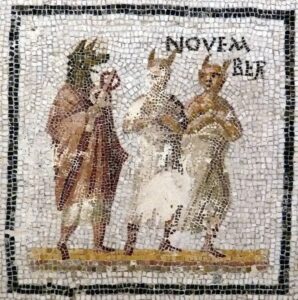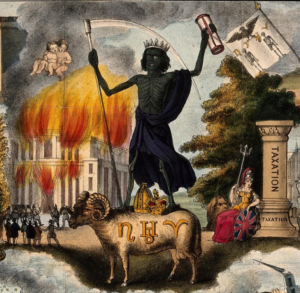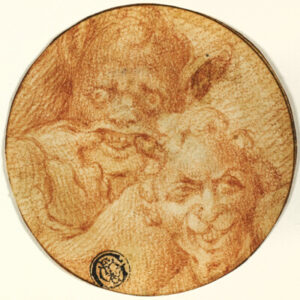Know Your Devils
 As the US presidential election looms ever closer, Jupiter and Uranus are conjoining in the sky. The mass mood is agitated, electric, prickly.
As the US presidential election looms ever closer, Jupiter and Uranus are conjoining in the sky. The mass mood is agitated, electric, prickly.
Will we meet this moment with insight and enthusiasm, or with frazzled burn-out? It depends on our understanding of the forces at play.
Uranus, the planet of disruptive change, signifies the sense of urgency upon us. Jupiter, the planet of religion, signifies higher principles, gods and devils.
Right now, it’s urgently necessary to name our devils, and to make allies of them.
Old Devils
Every era gets the devil its deserves.
The ruling classes have always known how to use devils. To keep the rabble compliant, a smart king would promise to protect them from threats. Ideally, these were threats that everybody agreed upon. In the old days, this was easy enough. Kings could blame raiding parties on foreign invaders. Priests could blame Satan — and his servants, old women – for failed harvests.
For my parents’ generation, it was Oppenheimer’s bomb. The mushroom cloud became the diabolical image of its era. It inspired the darkest comedy ever made, Dr Strangelove, and a movement to Ban the Bomb — a phrase that, here in the mid 2020s, sounds as dated as Elvis and bobby socks. This is true despite the fact that the stockpiling of these weapons has increased, not decreased. But somewhere between the Bay of Pigs and the fall of the Berlin Wall, nukes lost their apocalyptic urgency.
despite the fact that the stockpiling of these weapons has increased, not decreased. But somewhere between the Bay of Pigs and the fall of the Berlin Wall, nukes lost their apocalyptic urgency.
Their meaning had derived from the Cold War. Those were simpler times. No less stupid, but simpler. Having a clear-cut bogeyman like communism made for a persuasive motivational story, a story as black-and-white as our TV sets.
As the times move on, so do the devils. Who’s our devil now?
Evil empire
The Democracy-vs.-Communism parable has become obsolete, like a tangled old videocassette tape with no player to play it on. Although it is still half-heartedly referenced by  unimaginative politicians, it has outlived its meaning.
unimaginative politicians, it has outlived its meaning.
Consider how the presidential honorific “the leader of the Free World,” once invoked earnestly and respectfully, is now used mostly ironically, as a sarcastic set-up in a joke. The phrase dates from a time when the country genuinely saw itself as a shining city on a hill, a story made possible by the existence of a wicked counterpart: the USSR.
Rest in peace, Evil Empire. In your absence, Uncle Sam’s myriad factions have come undone. For the first time in historical memory, the American public cannot agree on an external enemy. Is it Israel or Palestine, Putin or NATO? Even nazis and dictators no longer qualify as universally-agreed-upon bad guys.
Who’s left, that we can all hate together?
Plethora of devils
On the domestic front, by contrast, we have plenty of devils. The airwaves are buzzing with good-guy/ bad-guy narratives.
But no unifying ones. No grand national drama that we can rally around. Instead of a common foe, Americans have a cacophony of civil wars, as chaotic as drops of water skittering around a hotplate. The new fighting is as confused as it is vicious, with factions that don’t fit into the familiar red-state-vs.-blue-state categories.
Identity politics and culture crusades have replaced old-school politics. In the battle for newsworthiness, anomalous figures like Trump-voter Caitlin Jenner and scionic breakaway RFK Jr. get a disproportionate amount of attention. As for what any of them stand for, it’s strangely unclear.
The sound-bite media aren’t sure how to label these players. Do non-Trump Republicans fit into the same category as the QAnon kind? For that matter, does Republicanism even apply to what Trump is?
Until very recently, we didn’t even have a vocabulary for trans rights or woke/ anti-woke, let alone a sense of what their advocacy implied. Campaign strategists must be throwing out the window everything they learned in campaign-strategy school. Pollsters too. Gone are the days of a voter blandly voting a straight party ticket, the way her parents and grandparents did.
Now everybody’s hunkered down in their tight little culture-war trenches, getting their news from TikTok, looking to Kanye and Elon and Taylor Swift for political wisdom.
 Pluto unmasking
Pluto unmasking
It’s hard for the pundits to acknowledge the demise of the old template: worker-friendly Democrats vs. country-club Republicans. But it’s been dead since the rise of reactionary populism.
Remember the Tea Party movement? It arose as Pluto (breakdown) was gaining traction in Capricorn (government), capped off by the US Pluto Return, still in orb. Its last hurrah is this November ’24, when it will be opposed by Mars. Wowza.
The long agonizing Pluto Return has been America’s big karmic reveal: the planet of power, back home in the house of money. As Adam Gopnik puts it,
Reagan and Thatcher, or their financiers, brought about an era of plutocratic planetary rule, and absent a handful of congressfolk noted for their extreme rarity, neither party has much quarrel with that. Liberals … are fatally disingenuous about the real role of money in bourgeois representative politics; politics in America, in particular, has been wholly “colonized” by capital. Our legislative assemblies are filled with rich people who mainly talk to other rich people.
Game-show-ified
The Democratic establishment held onto its fictions longer than the Republicans, who have taken off the mask entirely.
This was a tactical decision, as Noam Chomsky points out. The GOP was becoming so identified with the 1% that they stopped trying to galvanize people with actual policies. They had to find some other way to mobilize the voters. So they started to stoke fear in their base by means of “social issues” (abortion, gender, race, bibles in the classroom).
issues” (abortion, gender, race, bibles in the classroom).
As November 2024 looms, we have reached the full-on game-show-ification of US politics. The “liberal” establishment has lost its veneer of legitimacy, and the right wing, once genuinely conservative, has degenerated into a meth’d-up clown show.
Whatever the two halves of this duopoly used to mean, they don’t mean that now. At the moment the donkey and elephant are morphing into some weird new creature, wiggling under the sheet in Frankenstein’s laboratory, trying to settle into an identity, as American democracy decides how or whether it’s going to be reborn.
 New devils
New devils
We may no longer live in an era where we can be burned at the stake for heresy, or in a police state where allegiance is enforced upon pain of death.
But as citizens of the wired world, we are up against a new kind of groupthink. The brainwashing is in our phones.
We are in thrall to the devils of the Information Age: the algorithms, which have figured out what we’re interested in, and are designed to keep us interested.
Media
The point of media is to mediate between ourselves and the outer world. But there’s a lot of world out there. What parts of it should be covered?
The corporate decision-makers have noticed, for instance, that Americans are interested in innocents dying in Ukraine and Gaza, but not so much in Sudan and Haiti. So it’s the white-people violence that gets the press. Market researchers have figured out that we care about rabbits being tortured in cosmetics labs, but not so much about child labor in mineral mining. So we hear more about the former than the latter.
What is happening in America is not the design of an articulated ideology. No Mein Kampf or Communist Manifesto announced its coming. It comes as the unintended consequence of a dramatic change in our modes of public conversation. But it is an ideology nonetheless, for it imposes a way of life, a set of relations among people and ideas, about which there has been no consensus, no discussion and no opposition. Only compliance. — Neil Postman
Postman, writing forty years ago, was referring to television. But his point, inspired by the visionary Marshall McLuhan, fits the internet age to a tee.
Cosmic antidote
If media onslaught is the new devil, how do we make it an ally? How do we use our phones as a tool rather than a master?
Astrologically speaking, there’s always a cosmic Rx for what ails us. The sky comes up with precisely the planetary teachings required to get us through the social chaos in play.
So, right on time, we’re getting a transit that supports grounded, independent thinking: the Jupiter-Uranus conjunction (see the SkyWatches for details). It’s sharp and explosive, yet in Taurus, the earthiest of the earth signs.
 Jupiter (understanding) and Uranus (originality) are both planets of freedom. They conjoin every 14 years, to give us a time-specific antidote to complacency and denial. The transit suggests that if we want to resist the lure of brain-deadening conformity, we need something to mediate between ourselves and the media.
Jupiter (understanding) and Uranus (originality) are both planets of freedom. They conjoin every 14 years, to give us a time-specific antidote to complacency and denial. The transit suggests that if we want to resist the lure of brain-deadening conformity, we need something to mediate between ourselves and the media.
That something is our own clarity of mind.
Side of the angels
Those who are especially sensitive to these transits will be emboldened to use their unique intelligence in a way that will encourage others to do the same.
If an occasion arises that invites you to share your perspective – to debate an ideological foe, or to clarify an ally’s fuzzy thinking – first check to see whether the impulse is ego- driven or feels genuine. If it feels genuine, speak up, whole-heartedly.
driven or feels genuine. If it feels genuine, speak up, whole-heartedly.
Listen whole-heartedly, too. Under these skies, we will be attracted to those who are telling the truth with piercing clarity. Identify these voices, and learn from them.
This is one of those historical moments when we want to be on the side of the angels.
Images
Tea party movement, Politico
game show parody
Two Devils, after Michelangelo Buonarroti
Uranus, New York Times
Angel over a Table with Flowers, 1930/60, after Marc Chagall
